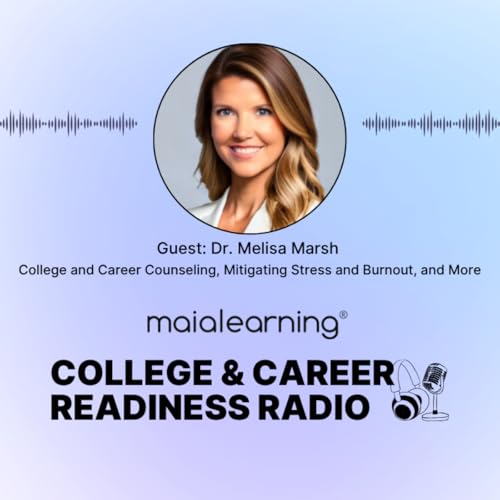
College and Career Counseling, Mitigating Stress and Burnout, and More with Dr. Melisa Marsh
カートのアイテムが多すぎます
カートに追加できませんでした。
ウィッシュリストに追加できませんでした。
ほしい物リストの削除に失敗しました。
ポッドキャストのフォローに失敗しました
ポッドキャストのフォロー解除に失敗しました
-
ナレーター:
-
著者:
このコンテンツについて
Our guest for this episode of College & Career Readiness Radio is Dr. Melisa Marsh, expert in both college and career counseling and stress and burnout in education.
College and career readiness isn’t just about admissions anymore—it’s about multiple pathways. Dr. Marsh emphasizes validating every option: four-year colleges, technical schools, associate degrees, and direct workforce entry.
Dual enrollment programs and articulated agreements between high schools and colleges save money and time, allowing students to earn valuable credits before graduation.
The old stigma against two-year and technical colleges persists—often more among parents than students. Educators and counselors play a crucial role in reframing this narrative and promoting affordable, high-value state options.
Schools can actively build partnerships with nearby institutions, bringing college and technical school reps to high school campuses and organizing visits so students see hands-on programs in action.
Counselors should use interest inventories and aptitude assessments to help students align passions and talents with viable academic and career tracks.
State-mandated assessments support this work, helping students discover strengths and explore related careers before committing time or money to a direction that may not fit.
Strong partnerships between high schools, two- and four-year institutions, and workforce partners are critical. Establishing contacts and regular events creates real opportunities for students to connect their K–12 journey with post-secondary success.
Counselors should proactively educate both students and families about every available pathway and state-sponsored opportunities, including tuition-free options for qualifying students.
School counselors partner with local colleges to provide campus visits and information sessions, demystifying alternative pathways and their benefits.
Dr. Marsh highlights alarming rates of stress and burnout among educators—especially school counselors who often operate as “certified yes people."
Chronic stress is distinguished from acute stress; it’s the chronic kind that leads to true burnout, impairing the ability to support students.
Dr. Marsh encourages educators to set professional boundaries, manage time effectively, and regulate their own emotions as well as those of staff.
Research shows just five deep breaths can reset the nervous system; educators should take intentional “brain breaks” during the day.
Dr. Marsh stresses the importance of shutting down after hours (e.g., 6 p.m. no email rule) and modeling this for staff, encouraging a “tech detox” in the evenings.
School leaders can delay emails and messages, ensuring staff are not burdened with notifications outside work hours—unless an emergency arises.
Scheduled fun and emotional check-ins are part of fostering positive faculty culture and retention.
School leaders should prioritize giving staff the “gift of time,” especially during busy periods like pre-planning.
Dr. Marsh’s final message to the field: Dream big and encourage students to do the same. Even if a path isn’t direct, there are always ways to reach your goals—never give up, and always seek the next step forward.
If you want to learn more about tips and tricks for college and career counselors, book a time to see a demo of the MaiaLearning.
If you want to talk to the host of the show about college and career readiness,book a time to meet.



